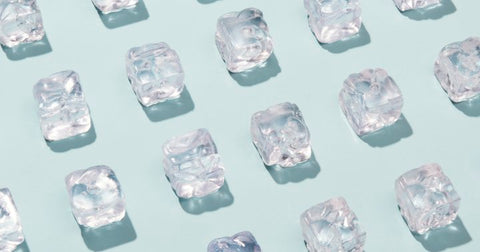When anxious feelings arise, it’s helpful to be equipped with management techniques in your toolbox. Similar to breathwork and meditation, mbg recently discovered one free and effective way to quell anxiety—and it’s seriously cool (at least, in terms of temperature).
According to a TikTok video from London-based surgeon Karan Rangarajan, MBBS, BSc, sucking on a piece of ice can help manage anxiety. To figure out exactly how ice does this, mbg spoke with Uma Naidoo, M.D., nutritional psychiatrist and author of This Is Your Brain on Food. Here’s what she has to say about the chill hack.
How does ice help manage anxiety?
There are two main ways ice cubes can manage anxiety, according to Naidoo: Advertisement
1. Distracts from anxious thoughts.
Firstly, Naidoo says sucking on an ice cube can distract someone from their anxious thoughts by shifting attention to the cooling sensation in their mouth. “In addition, distraction lowers amygdala activation in the brain,” Naidoo explains. The amygdala is in charge of emotional processing, including anxiety, so reducing activity in this region will inevitably reduce anxious feelings.
2. Activates the parasympathetic nervous system.
One side effect of the body’s natural fight-or-flight response is a dry mouth. “In anxiety, the brain tends to have a negativity bias,” Naidoo explains, “meaning worry causes anxious people to always be on the lookout for a threat.”When the body is fixated on a potential threat (in this case, anxiety or external stressors), it deprioritizes functions like digestion and saliva production.
The opposite of the fight-or-flight response is the rest-and-digest function, which is activated by the parasympathetic nervous system. Sucking on an ice cube will get rid of dry mouth and increase saliva production. “Sucking on an ice cube is therefore activating the parasympathetic nervous system to kick in, which can have a calming or distracting effect,” she says.
So, is the ice cube hack always useful?
While it can be useful in the moment, Naidoo says to be aware of a few things.
“In certain heart conditions, the ice cube can be ‘a shock’ to our bodily systems,” she says. Research has shown cold exposure can increase mortality rates for people with cardiovascular disease, so if you’re concerned, consider speaking with a primary care physician.
Allowing the ice to melt in the mouth is usually safe, but chewing on the ice frequently can have some unwanted side effects. Pagophagia, or the excessive eating of ice, can break down tooth enamel, making teeth more prone to cavities or chipping.
All that said, ice is just water. In general, it should be a harmless, healthy, and free way to help manage anxious thoughts as they arise.
Bonus hack: Freeze chamomile tea in an ice cube tray. While each person may respond differently, Naidoo says the tea could have a calming effect on the body, while the cold will have a calming effect on the mind.




